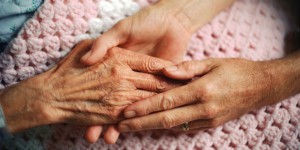This is a good question and one that may surprise many people.
Professional chaplains are people of any faith community–Jewish, Buddhist, Muslim, Christian, Hindu and more–ordained or endorsed by that community. Their role is to provide “emotional, spiritual, religious, pastoral, ethical, and/or existential care” in a secular setting. Those secular settings include “hospitals, corrections, long-term care, sports teams, palliative care, military, hospices, workplaces, mental health and universities. “
Providing this care in “secular” settings means that professional chaplains speak, listen to and care for people of any faith or of no faith. Their job is NOT to proselytize, convert or change the people they care for. No, their work is quite different.
“Being Present” in Healthcare
In a goal-oriented healthcare setting, like a hospital, the focus can often be efficiency or “fixing the problem.” Physicians, nurses and other healthcare providers may not have the time, energy or inclination to do the “deep listening” that is needed.
 That is where professional chaplains fit in. The goal of professional chaplains is to listen and learn how the person they are caring for finds meaning in life.
That is where professional chaplains fit in. The goal of professional chaplains is to listen and learn how the person they are caring for finds meaning in life.
According to Malcolm Marler, Director of Pastoral Care at the University of Alabama, Birmingham, “Our main goal is to figure out and to listen carefully enough so that we hear what it is that brings hope, comfort, peace to people in their lives…” That hope, comfort and peace can come from “…a faith community. Sometimes it’s from family. Sometimes it’s from other parts of their lives. It is how we listen for what brings them meaning, [that] helps them find hope and comfort.”
Professional Chaplains in Hospitals
“Many patients feel very isolated, particularly in hospitals,” Christina Puchalski, Director, George Washington Institute for Spirituality and Health states. Giving people the space and opportunity to express their feelings provides connectedness in a setting where they are disconnected.
Chaplains care not only for patients but also for hospital staff. For Kathleen Ennis-Durstin, senior chaplain at the Children’s National Medical Center, “there is a lot of crisis, a lot of concern that staff have when caring for really ill children and their families…we want to make sure that they can continue to be able to do their work in the most healthy ways.”
As Rabbi Arthur Rosenberg, chaplain for the Motion Picture and Television Fund’s Senior Care and Retirement Center states, “The people who work in security or…operators on the phone, everybody is involved in the care of the family unit…” In fact, he has found that when someone is seriously ill or even passes away, “the person experiencing the greatest impact could be the person you are least likely to consider.”
Measuring Intangibles
Perhaps it seems strange to try to put a monetary value on this work. For example, an impromptu wedding is needed so that patriarch Albert, who had just suffered a massive heart attack, can be present at his grandchild’s marriage: this, as with so many other moments of caring, are worth so much to so many.
an impromptu wedding is needed so that patriarch Albert, who had just suffered a massive heart attack, can be present at his grandchild’s marriage: this, as with so many other moments of caring, are worth so much to so many.
Spiritual Coping Strategies
And efforts to apply quantitative research methodologies to “meaning making” or “spiritual coping” are not easy.
Positive spiritual coping is defined as seeking spiritual connection, seeking love and protection of a higher power. Negative spiritual coping involves feeling abandoned or punished, pleading for intercession, or experiencing spiritual discontent.
An extensive review of the literature conducted by the Healthcare Chaplaincy Network states that “Even where spiritual care is officially included in the care provided, there is virtually no research-informed evidence for how to have that care contribute predictably to positive health outcomes….no way to determine if and how spiritual care contributes value to the health system or to maximize that value.”
However, a 2014 study of adolescents with Cystic Fibrosis published in the Journal of Cystic Fibrosis found that over a 5 year period those who reported using positive spiritual coping strategies had associated a”slower decline in pulmonary function, stable vs. declining nutritional status, and fewer days hospitalized.”
Older studies of adults and spiritual coping have found some interesting associations; yet further research is needed to truly discern the impact of spiritual coping.
What are your experiences with professional chaplains? Would you like to see more professional chaplains in healthcare settings?






Your first sentance contains what may be a common mistake, perhaps a typo: “Hindi” is not a faith group, it’s a language spoken throughout parts of India, Pakistan and elsewhere by persons of all faiths. The faith group I think you want to reference is “Hindu” whose world-wide adherents speak a variety of languages, including but not exclusively hindi.(http://www.diffen.com/difference/Hindi_vs_Hindu).
Thank you for the correction Bill…I did have a typo! Changing and thanking you for this important catch. Keep reading! Kathleen
Thanks for this article. After having done one unit of CPE, I have been laboring to put in words what professional chaplaincy is about without sounding wordy.You have captured it so clearly and precisely.Thanks .
Thank you so much for your comment. Best wishes in your work, Kathleen
More information on other professional chaplain groups may be found at CPSP.org, NACC.org, NAJC.org, CSCPF.org, and healthcarechaplaincy.org — just to name a few.